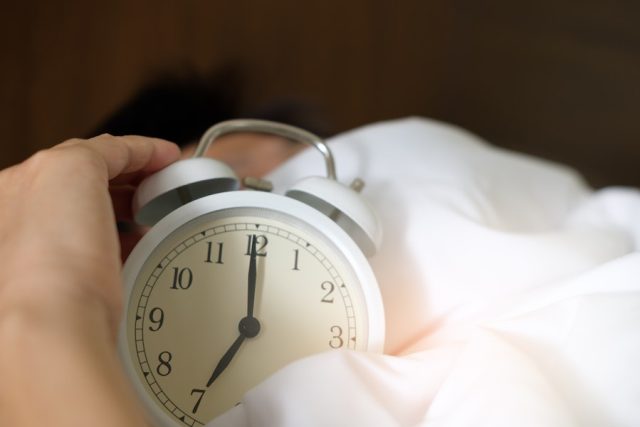Getting a good night’s sleep is crucial for overall health and well-being. Unfortunately, many people struggle with sleep problems, such as difficulty falling asleep, staying asleep, or waking up too early. These issues can lead to chronic sleep deprivation, which can have a negative impact on physical and mental health.
One way to address these problems is by resetting your sleep clock. Your sleep clock, or circadian rhythm, is a natural, internal system that regulates the sleep-wake cycle. It repeats roughly every 24 hours and can be influenced by external factors like light and temperature.
Here is a guide to resetting your sleep clock in simple steps.
1. Understand Your Sleep Chronotype
Your sleep chronotype is the natural tendency of your body to feel awake or sleepy at certain times of the day. It can vary from person to person. Some people are naturally night owls, while others are early birds. Understanding your sleep chronotype can help you tailor your daily routine to align with your body’s natural rhythm.
To determine your sleep chronotype, you can take a sleep chronotype quiz available online. The quiz will ask you questions about your energy levels, mood, and sleep patterns at different times of the day. This will help you understand your natural tendencies and the times when you are biologically programmed to be most awake and alert or sleepy and relaxed.
2. Create A Consistent Sleep Routine
A consistent sleep routine is crucial for resetting your sleep clock. Your body thrives on routine, and maintaining a regular sleep schedule reinforces natural circadian rhythms.
Here are some tips for creating a consistent sleep routine:
- Set a fixed bedtime and wake-up time. This aids in aligning with your body’s natural circadian rhythm.
- Stick to the schedule, even on weekends. Having this consistency helps solidify your sleep routine.
- Adjust the schedule in small increments if necessary. Minor adjustments, such as 15-30 minutes earlier or later, can make the transition easier and more sustainable.
By following these tips, it will be easier for you to fall asleep at night and wake up refreshed in the morning. It may be challenging at first, especially if you are used to a more erratic schedule, but with time and persistence, it will become a natural habit.
3. Limit Exposure To Screens Before Bed
Exposure to screens before bedtime can disrupt your sleep. The blue light radiated from screens can disrupt the production of melatonin, a hormone that plays a pivotal role in regulating sleep. Consequently, excessive screen time before bed can make it harder to fall asleep and adversely affect sleep quality.
To mitigate this, it’s advisable to turn off all electronic devices at least an hour before going to bed. Moreover, instead of scrolling through social media or watching television, consider alternatives such as reading a physical book, listening to calming music, or practicing mindfulness exercises. These activities help reduce exposure to blue light but also aid in relaxing the mind and preparing the body for a restful night’s sleep.
4. Develop A Relaxing Bedtime Routine
Creating a relaxing bedtime routine is essential in resetting your sleep clock. Engaging in calming activities before bed helps signal to your body that it’s time to relax and prepare for rest. A consistent routine can help ease the transition from wakefulness to sleep and, in turn, improve sleep quality.
Begin with soothing activities like taking a warm bath, reading a book, or practicing mindfulness exercises approximately an hour before bedtime. These practices can help create a series of habits that signal to your body that it is time to wind down and prepare for sleep. With time and practice, these habits will become ingrained and will aid in resetting your sleep clock and improving overall sleep quality.
5. Establish A Comfortable Sleep Environment
Creating a comfortable and serene sleep environment is essential to resetting your sleep clock. Your surroundings can have a significant impact on your sleep quality. Factors such as room temperature, lighting, and bedding all play a crucial role in creating an environment conducive to sleep.
Here are some tips for creating a comfortable sleep environment:
- Make sure your mattress and pillows are comfortable and supportive.
- Keep the bedroom dark, quiet, and cool. Consider using blackout curtains, earplugs, or a white noise machine if necessary.
- Avoid having any electronic devices in the bedroom.
Remember, your bedroom should be a sanctuary reserved for sleep and relaxation. Make it a priority to create a space that is comfortable and inviting.
6. Limit Caffeine And Nicotine Intake
Caffeine and nicotine can disrupt sleep patterns and make it more difficult to fall asleep. Consuming these substances, especially in the afternoon or evening, can interfere with the body’s natural sleep-wake cycle and contribute to sleep problems. Thus, limiting caffeine and nicotine intake is essential to reset the sleep clock successfully.
It is advisable to avoid consuming caffeine-containing products, such as coffee, tea, and soda, as well as nicotine-containing products, such as cigarettes and e-cigarettes, in the hours leading up to bedtime. If necessary, consider gradually reducing your intake of these substances over time to minimize withdrawal symptoms.
Furthermore, be mindful of your body’s reaction to these substances and adjust your consumption accordingly. A conscious effort to limit caffeine and nicotine intake can lead to significant improvements in sleep quality and help in resetting the sleep clock.
7. Get Regular Exercise
Regular physical activity has numerous health benefits, one of which is improving sleep quality. It aids in regulating the body’s circadian rhythm, making it easier to fall and stay asleep throughout the night. It can also help reduce stress and anxiety, common contributors to sleep problems.
Here are some tips for implementing regular exercise:
- Aim for at least 30 minutes of moderate exercise most days of the week.
- Try to finish exercising at least three hours before bedtime.
- Opt for light activities like stretching or yoga in the evening.
By incorporating regular physical activity into your daily routine, you can improve your physical and mental well-being, making it easier to reset your sleep clock and enjoy better sleep quality.
8. Expose Yourself To Natural Light During The Day
Exposure to natural light during the day can help regulate your sleep-wake cycle. Natural light helps regulate the production of melatonin, a hormone that plays a crucial role in sleep. By spending time outside during the day or opening your curtains to let in natural light, you can help reinforce your body’s natural rhythms and make it easier to fall asleep at night.
Aiming for at least 30 minutes of exposure to natural light each day is advisable. If you work indoors, try to take short breaks outside during the day or sit near a window if possible. On weekends, consider spending more time outdoors, whether it’s going for a walk, gardening, or just sitting outside. Regular exposure to natural light can have a significant impact on your sleep quality and help in resetting your sleep clock.
9. Manage Stress And Anxiety
Stress and anxiety are common culprits of sleep problems. High stress or anxiety levels can make it difficult to fall asleep or stay asleep throughout the night. Therefore, managing stress and anxiety is essential for resetting your sleep clock and improving sleep quality.
- Incorporate relaxation techniques such as deep breathing, progressive muscle relaxation, or mindfulness meditation into your daily routine.
- Establish a regular exercise routine, as physical activity is known to reduce stress and anxiety.
- Consider talking to a mental health professional if you are struggling to manage stress and anxiety on your own.
Taking proactive steps to manage stress and anxiety can create a more balanced and relaxed state of mind, making it easier to reset your sleep clock and enjoy better sleep quality.
Conclusion
Resetting your sleep clock is crucial for achieving better sleep and, consequently, better overall health. Understanding your sleep chronotype, creating a consistent sleep routine, and making lifestyle changes can help reset your sleep clock and improve your sleep quality. Remember, it is essential to be patient and consistent with these changes, as it may take some time to see results.














